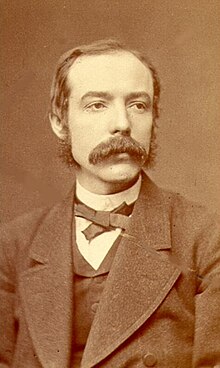Georg Hermann Quincke

Georg Hermann Quincke (November 19, 1834 – January 13, 1924) was a German physicist.
Born at Frankfurt (Oder), Quincke was the son of prominent physician Geheimer Medicinal-Rath Hermann Quincke and the older brother of physician Heinrich Quincke.
Quincke received his Ph. D. in 1858 at Berlin, having previously studied also at Königsberg and at Heidelberg. He became privatdocent at Berlin in 1859, professor at Berlin in 1865, professor at Würzburg in 1872, and in 1875 was called to be professor of physics at Heidelberg, where he remained until his retirement in 1907. His doctor's dissertation was on the subject of the capillary constant of mercury, and his investigations of all capillary phenomena are classical.
Quincke also did important work in the experimental study of the reflection of light, especially from metallic surfaces, and carried on prolonged researches on the subject of the influence of electric forces upon the constants of different forms of matter, modifying the dissociation hypothesis of Clausius. Quincke received a D. C. L. from Oxford and an LL. D. from Cambridge and from Glasgow and was elected an honorary fellow of the Royal Society of London. His contributions to physics and other fields of science are numerous. He also published a Geschichte des physicalischen Instituts der Universität Heidelberg (1885).
References
- "Heinrich Irenaeus Quincke". Who Named It? (Retrieved January 23, 2007).
This article incorporates text from a publication now in the public domain: Gilman, D. C.; Peck, H. T.; Colby, F. M., eds. (1905). New International Encyclopedia (1st ed.). New York: Dodd, Mead. {{cite encyclopedia}}: Missing or empty |title= (help)
- 1834 births
- 1924 deaths
- German physicists
- People from Frankfurt (Oder)
- People from the Province of Brandenburg
- University of Königsberg alumni
- University of Heidelberg alumni
- University of Heidelberg faculty
- Humboldt University of Berlin alumni
- Humboldt University of Berlin faculty
- University of Würzburg faculty
- Foreign Members of the Royal Society
- German academic biography stubs
